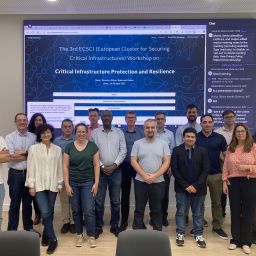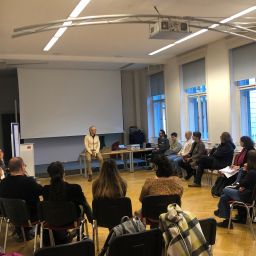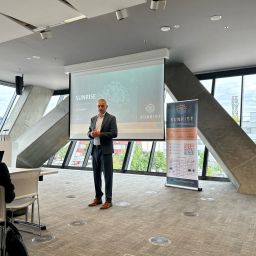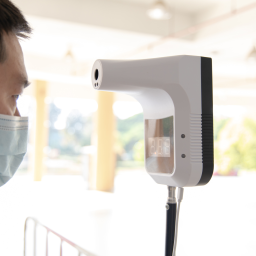
SUNRISE CRITICAL INFRASTRUCTURE SERIES
SUNRISE takes an interdisciplinary approach, ensuring that the long- and short-term changes in our societies during a pandemic are considered by design. To ensure resilience and stability of CIs, we require approaches and solutions that will not only provide better resilience to our physical infrastructures, but such that will also consider our social critical infrastructures: citizens, workforce, and policy makers. In this respect it is important to execute also policy making activities targeted at specific audiences to increase awareness of emerging risks and enhance knowledge of effective means to manage them among the CI authorities, operators, and users.
Presentation of SUNRISE project at the National Consultation of the State Council of the Republic of Slovenia was implemented on November 27, 2023, when the State Council of the Republic of Slovenia held a national consultation entitled “Resilience and business continuity of key organizations – an imperative of modern society” in the co-organization of the State Council, the Institute for Corporate Security Studies (ICS) and the Slovenian Association for Corporate Security.
The participants of the consultation were addressed by the President of the National Council of the Republic of Slovenia, Mr. Marko Lotrič. The consultation was moderated by Associate Prof. Dr. Denis Čaleta, President of the ICS Board and Mr. Rajko Fajt, State Councillor, Chairman of the Commission of the State Council for State Regulation.
Within the framework of the consultation, 3 key EU projects in this field were presented, which are bringing and presenting a lot of good practices and new knowledge that need to be implemented in the operating system to ensure a higher level of resilience of Slovenian organizations. Based on the experience of major EU projects, the consultation helped policy makers, strategic management and the professional public to identify good practices in the introduction and construction of an appropriate business continuity system in their organizations. Slovenian partners are actively involved in the framework of important EU projects in the field of critical infrastructure business continuity, namely ATLANTIS – Improved Resilience of Critical Infrastructure to Large-Scale Transnational and Systemic Risks, SUNRISE – Strategies and Technologies for Integrated and Resilient Critical Infrastructure and Vital Services in Pandemic-Affected Europe, and PRECINCT – Readiness and Resilience of Critical Infrastructure for Cascading Cyber – Physical Threats.
At the national consultation, we had the opportunity to present the SUNRISE project, presented by Dr. Milan TARMAN, ICS. An outline of the SUNRISE project and its Resilience and Business Continuity aspect, the mission of the project, the challenges faced and the pathways to solutions, the roles of the Slovenian partners and the status of the project were presented.
Before presentation of SUNRISE project and projects ATLANTIS and PRECINCT, also presented by ICS presenters Dr. Jolanda Modic and Mr. Aljoša Kandžič, round table took place moderated by Associate Prof. Dr. Denis Čaleta, President of the ICS Board, in which very important actors participated, namely Mr. Boštjan Šefic, Advisor in the Prime Minister’s office/coordinator for flood relief, Dr. Uroš Svete, Director of the Information Security Office of the Republic of Slovenia, Mr. Boštjan Pavlin, Director general of the Directorate for Defense Affairs of the Ministry of Defense of the Republic of Slovenia, Mr. Marko Mišmaš, Director of the Agency for Communication Networks and Services of the Republic of Slovenia, Mr. Aleksander Mervar, Director of ELES and Mr. Aleš Skok, President of the board of Cinkarna Celje d.d.
The conclusions of the National Consultation of the State Council prepared by ICS in cooperation with the State Council of the Republic of Slovenia pointed out that large-scale crisis situations, such as the floods in the summer of 2023 in Slovenia, have shown that only those organisational environments that provide an appropriate systemic approach to ensuring business continuity planning will survive successfully. Such organizations are more robust and flexible in responding to a whole series of crises that have been following each other more frequently in recent times. If in this context we highlight organizations that manage critical infrastructure and essential services that are crucial for the functioning of the wider social community, then the importance of a system of continuous operation is even more important. The consultation drew attention to the procedures for transposing two important European directives in the field of critical infrastructure and information security into Slovenian legislation (the NIS-2 Directive and the CER Directive). Both Directives deal with ensuring adequate business continuity of essential entities and services, their robustness and uniform stress tests to verify their ability to operate in crisis situations. The purpose of the consultation was to discuss and find conclusions that will help strategic institutions in the country to find effective ways to integrate the aforementioned legislation into our legal order.
The participation of invited guests, the number of participants and the depth of the discussions showed the topicality of the selected topic of the consultation. The consultation was also broadcast live on National Television.
In January 2024, the State Council adopted a decision to take note of the Conclusions of the consultation and called on the Government of the Republic of Slovenia and the Ministry of Defence, the Ministry of Infrastructure, the Ministry of Digital Transformation, the Ministry of Economy, Tourism and Sport, the Ministry of the Interior, the Ministry of Higher Education, Science and Innovation and the Ministry of Education to consider the conclusions of the consultation and to take a position on them.
In the future, it will be very important to carry out appropriate stress tests for different segments of critical infrastructure, as only through such tests will the gap between the planned and real situation in critical infrastructure segments be more realistically assessed. This will be an important step in ensuring higher resilience of all organizational levels in society.
One of the important conclusions was also that professional associations, such as ICS, that deal with areas that have a direct impact on raising the understanding of the importance of resilience of organizations and society as a whole must continue to be one of the main partners of the state in ensuring a higher level of security awareness of all key stakeholders, with particular emphasis on important economic entities.
Consequently ICS will continue to implement its mission: to incorporate and develop new knowledge, experiences, findings and needs as well as to promote interests in the field of corporative security in both, national and international environments. ICS will also further create enhancing links and thereby build way to success!
Link to the conclusions of the National Consultation of the State Council: https://www.ds-rs.si/sites/default/files/2024-01/11ds-13_skl._zaklj._posveta_odp.in_nepr.delov.klj.org._p.pdf
Written by: Associate Prof. Dr. Denis Čaleta, President of the ICS Board and Dr. Milan Tarman, Institute for Corporate Security Studies (ICS)
















